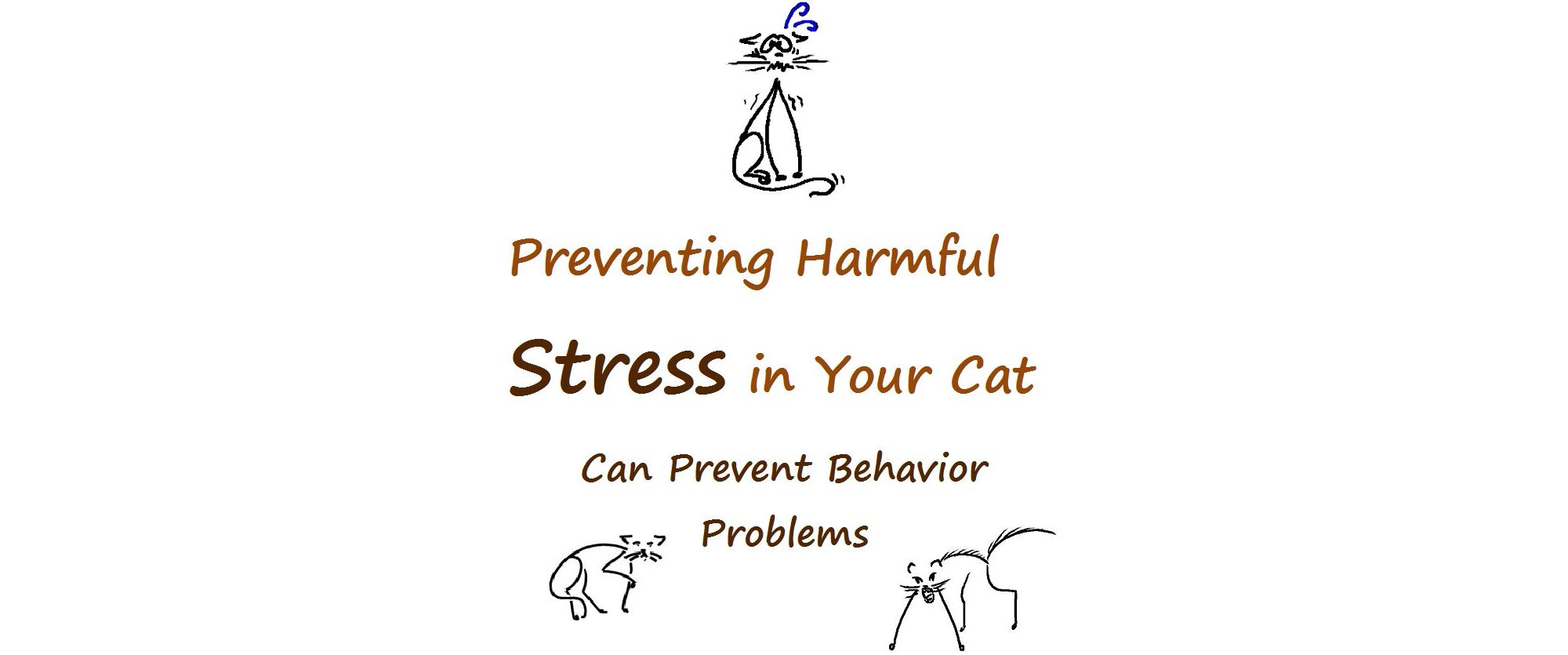EXAMPLES OF HARMFUL STRESS:
Irregular and unpredictable times where cats are kept hungry for extended periods. Always feed your cat around the same time, morning and night.
Feline practitioners recommend that a cat should not go without food for longer than 24 hours (less for kittens) and that a veterinarian should be consulted if your cat’s appetite lessens over more than 48-72 hours. Your cat’s liver may begin to shut down and death could occur. Don’t withhold food from your cat unless it is the night before surgery.
Irregular and unpredictable cleaning of the litter box. We always emphasize the importance of cleaning the litter box daily. A dirty litter box is probably the biggest cause of a cat’s avoidance of her litter box. It is stressful to your cat to have to enter a smelly, dirty litter box. Cats are very clean in their habits.
Absence of interaction with humans and the lack of petting and affection. Like people, a cat will respond and behave better if she feels loved and wanted. Take time to show your cat affection and to play with her each day.
Changes in social environments. For example, a new baby, spouse, or roommate; a change in your work schedule; adding another cat or pet, etc. All are stressful to your cat.
Changes in the physical environment. For example, moving to a new home, adding new furniture to your existing home, etc.
Lack of mental stimulation. For example, no new toys; little attention from the cat’s owner. Cats get depressed like us. Boredom can be mind-numbing. The zest for life can be lost.
Anything that acutely startles the cat, such as very loud noises can create a lot of stress.
COMMON INDICATIONS OF STRESS, ANXIETY OR FEAR IN YOUR AT:
Decreased grooming. This appears with cat depression, mourning, or increased antagonistic interactions with other cats.
Decreased social interaction. Your cat hides and avoids you and other pets in the household.
Decreased active exploration and play behavior.
Greater proportion of your cat’s daily time is spent awake. For example, your cat is awake more and spending more time scanning and watching her surroundings–looking for danger.
Increased hiding. Withdrawing from everything (signs of depression).
Changes in eating–either not eating or over-eating.
The development of excess fears, anxieties and stress can be lessened and even prevented by exposing kittens (in particular), as well as adult cats to strange noises, people, places, and experiences under calm, fun conditions and by using positive reinforcements such as treats, toys, petting and praise. You should avoid exposing your cat to strongly fearful events (like a very aggressive dog who would love to “eat” your cat).
Provide your cat with areas to hide in. Cardboard boxes, open carriers, an open closet door all can provide good hiding places that will give your cat an escape if she gets stressed. You need to know what kind of areas your cat prefers. Does she hide under things? Does she hide high up on a shelf: Learn your cat’s preferences. Make the area accessible to your cat at all times and place a comfortable bed in that area.
Even if you must cage your cat, say due to illness, providing a hiding place will reduce her stress. It gives your cat an alternative choice rather than having to confront the situation which is stressing her out. When we first bring in a rescued cat and confine that cat, we always provide a place she can hide in, and observe and assess her surroundings from. Simply tape some newspapers over one corner of the cage or put a box on its side (if there is room). It will seem more enclosed and thus give the cat a “safe zone” to hide in. we try not to bother the cat when she is in her safe zone. This helps to reduce her stress level. In time, she’ll spend less time hiding as she grows more confident with her surroundings.
Reducing and, preferably, eliminating what stresses your cat out is your goal. Fewer behavior problems, as well as stress-triggered physical problems will result.
Stress affects such physical problems as feline interstitial cystitis, and obesity and its associated risks (diabetes-mellitus, hepatic lipidosis, and heart disease).
If none of the above remedies work with your cat, enlist your veterinarian’s help. Perhaps oral treatment with anti-anxiety medication is needed.
1-28-2017bct


